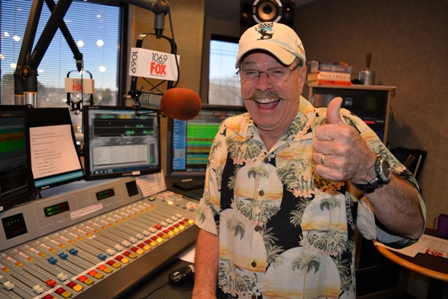By Jeff Maisey
For all of my childhood and teenaged years, Mike Arlo was on the radio, spinning a significant part of the soundtrack of my life. Today I turn on the radio in my car, and he’s still there, a familiar, friendly voice.
When Arlo made his debut in 1975, commercial radio was undergoing an exciting transformation from Top 40 pop hits and country music on the AM dial to the full stereo, FM frequency. The revolution was perfect for a new format called Album Oriented Rock (AOR).
“It was early in 1975 when AOR was in its infancy,” said Arlo. “The disc jockies back then selected the music that we played. You actually programmed your own show.”
Albums during the 1970s were considered a complete work. Each song was like a chapter in a book. The album was the sum of its parts. The song selection had a certain flow. Some were concept albums, like Pink Floyd’s “The Wall” and Jethro Tull’s “Thick as a Brick.” For rock music fans, it was the best of times.
Mike Arlo was “discovered” at a bar called the Brass Lantern in Virginia Beach. He was playing record albums from his personal collection on the venue’s Progressive Night. The DJs that recruited Arlo were from a station called Stereo 99, which was soon to be transformed into AOR formatted FM99.
Arlo started on the overnight shift – midnight to 6 am – while still maintaining his “day job” at Thrifty car rental. He soon moved to the morning drive shift and quickly became a popular on-air personality with his positive outlook.
“The thing about Arlo is that he’s so iconic from the way he sounds on the air,” said Mike Beck, FM99/The Fox radio group brand manager. “He’s always happy. I’ve never seen him angry. He’s got that mustache. Arlo can always tell you what was here before that because he’s lived here his whole life. It’s rare to find someone who has stayed in the same place for 40 years.”
FM99 played all of the hits and deep album cuts released by what are today considered classic rock artists. It was the most prolific time in rock history, and listeners in the pre-Internet world benefited greatly.
“Think about it: Led Zeppelin and all the great classic rock acts were on the road and touring, coming to the Hampton Coliseum or Scope,” Arlo said. “When you look back to 1977, when you had Fleetwood Mac’s ‘Rumors.’ You could play 6 or 7 songs from that one album. When ‘Hotel California’ came out we played every song from that album.”
There was no end it seemed: Queen, Aerosmith, Rolling Stones, Elton John, Yes, Thin Lizzy, Boston, Bruce Springsteen, Bad Company, Eric Clapton, and countless others were all in their prime. So, too, was Mike Arlo.
Back in the truly golden era of radio DJs developed a sign-off, or a slogan to say as they exited their shift. Arlo came up with “Bicycle – make it great day.”
“It was a funny expression we had in my little group of friends,” he explained. “It was a super way to start your day with a good attitude.”
Mike Arlo was on the air with FM99 for 21 years before the station flipped to a nu-rock format. This was a nationwide shift where traditional rock stations playing Bob Seger and Lynyrd Skynyrd were labeled “classic rock.” For Arlo, it simply meant walking down the hallway within the same office and donning a 106.9 The Fox shirt.
Arlo remains one of the most beloved radio personalities in Hampton Roads. His shift runs from 10 AM to 2 PM Monday through Friday, but thanks to technology you’ll likely “hear” his voice on weekends as well.
Though he no longer is allowed to play whatever he wants, Arlo is given some freedom and flexibility to play album oriented tracks as well as share his encyclopedic rock ‘n’ roll knowledge.
“On his show we have three places where we go deeper,” Beck explained. “One is called Arlo’s Archives at 10:30 every morning. He always picks a song he wants to tell a story about. At lunch, it’s the Electric Lunch where he plays requests from listeners. We have The Needle Drop just before 2 PM every day, which is a homage to vinyl.”
Mike Beck said classic rock continues to be the most popular format in rock music.
“Just like artists such as Mick Jagger and Paul McCartney, there’s no reason Arlo won’t continue to thrive because he’s so identified with the music, and the memories people have of him growing up.”
Arlo’s first day on the radio was February 22, 1975. Happy 40th anniversary!




